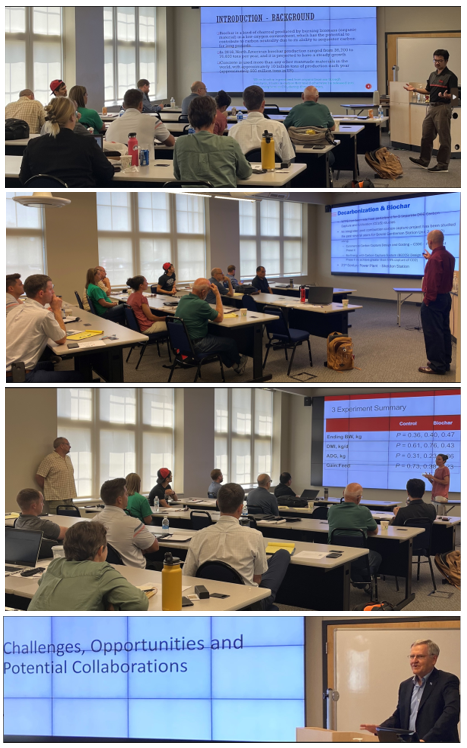
On August 17, 2023, the inaugural Biochar Workshop, sponsored by the Nebraska Center for Energy Sciences Research (NCESR), convened at the Prem S. Paul Research Center at the University of Nebraska-Lincoln (UNL).
Dr. Jerry Hudgins, Interim Director of the NCESR, commenced the event with his opening remarks, warmly welcoming all the attendees. Following Dr. Hudgins' introduction, Dr. Jiong Hu, Professor of Civil and Environmental Engineering, delivered a comprehensive overview of the workshop agenda and objectives. The workshop’s objectives are to disseminate comprehensive insight into various facets of biochar, facilitate networking and collaboration among key stakeholders, and assess and address the challenges and opportunities in biochar applications.
Mr. Jedd Fischer, Senior Project Manager at Nebraska Public Power District (NPPD), provided insights to the workshop participants on the work of NPPD across Nebraska and the relevance of this biochar research for NPPD’s customers.
During the workshop, five researchers from UNL delivered technical presentations based on their recent or ongoing research endeavors, with the majority of these projects receiving funding from the NCESR. In addition to Dr. Jiong Hu, the following experts shared their valuable research insights: Dr. Humberto Blanco (UNL Department of Agronomy and Horticulture), Dr. Michael Kaiser (UNL Department of Agronomy and Horticulture), Dr. Andrea Watson (UNL Department of Animal Science), and Dr. Nirupam Aich (UNL Department of Civil and Environmental Engineering). Their presentations delved into various topics, including leveraging biochar to enhance soil productivity, optimize concrete performance, manage methane emissions, refine water treatment processes, and contribute to carbon sequestration efforts.
Andrea Watson, Research Associate Professor at the Department of Animal Science of UNL, said “Improving the value of marginal or waste products can be done through incorporation of biochar in agriculture. While feeding to livestock is not currently an approved use of biochar, using biochar as a pen amendment in the livestock industry has great potential. This would capture value for the feedstock that is made into biochar, can improve nitrogen capture in livestock manure, and can benefit the soils the manure is spread on. Agriculture fits very well within a circular bioeconomy and biochar is one piece that can help keep nutrients in the cycle instead of exiting as waste.”
Michael Kaiser, Assistant Professor of UNL Department of Agronomy and Horticulture, stated, “Biochar produced from organic waste is, to date, one of the most promising materials suitable to improve the functioning of agricultural and urban soils. In our research, we focus on combining biochar with other sustainable soil management practices such as cover cropping, reduced tillage, and application of biosolids to explore synergistic effects on improving agroecosystem services and increasing resource use efficiency. The first data from our field experiments in Nebraska show significant and site independent increase in soil organic carbon storage by more than 50% after biochar application and increased soil nitrate retention due to iron oxide formation on the surface of biochar. Future analyses will reveal information about effects on biomass production, nutrient availability, soil water retention, and microbial community structure.”
The workshop concluded with a constructive discussion that centered on the challenges, opportunities and prospects for potential collaborations of biochar research and applications.
The workshop drew over 20 participants, spanning a diverse spectrum of stakeholders, including biochar producers, professionals from agriculture, forestry, and waste management, government officials and policymakers, environmental and conservation advocates, industry partners and associations, and esteemed researchers and academicians. Mr. Barton Barcel, Barcel Mill and Lumber Bellwood, NE said, “As a producer and supplier of biochar, one of our challenges has been to develop uses and markets for our product. Our relationship and research projects with Dr. Jiong Hu and other UNL professors have lead to some interesting outcomes and possibilities in the development of new, and improvements of existing products.”
Mr. Alan Dostal, NPPD, gave the closing remarks. Mr. Dostal expressed his appreciation to Dr. Hu for coordinating the workshop and to the rest of the presenters for their research on the important topic of biochar. This research could lead to a reliable carbon sequestration process that will be very important for NPPD and its customers.
Dr. Jiong Hu shared the genesis of the biochar workshop, revealing that the idea emerged during a discussion with Mr. Adam Smith, formerly affiliated with UNL Nebraska Forest Service and now with the US Forest Service. With the recent financial backing from NCESR for numerous biochar-related research initiatives, Dr. Hu recognized the importance of providing a platform for researchers to disseminate their findings not only amongst themselves but also to the wider public and stakeholders invested in biochar production and utilization. Dr. Hu said, “I sincerely thank NCESR for their invaluable support in making this workshop possible. The enthusiastic response from our attendees is truly heartening and underscores the burgeoning interest in this dynamic field. Biochar holds immense promise in tackling environmental and economic challenges concurrently. Nevertheless, the multifaceted nature of biochar research necessitates a collaborative, interdisciplinary approach. I hope this workshop has sown the seeds for continued exploration and innovation in the field of biochar, not only within the state of Nebraska but also across the broader landscape of the United States.”